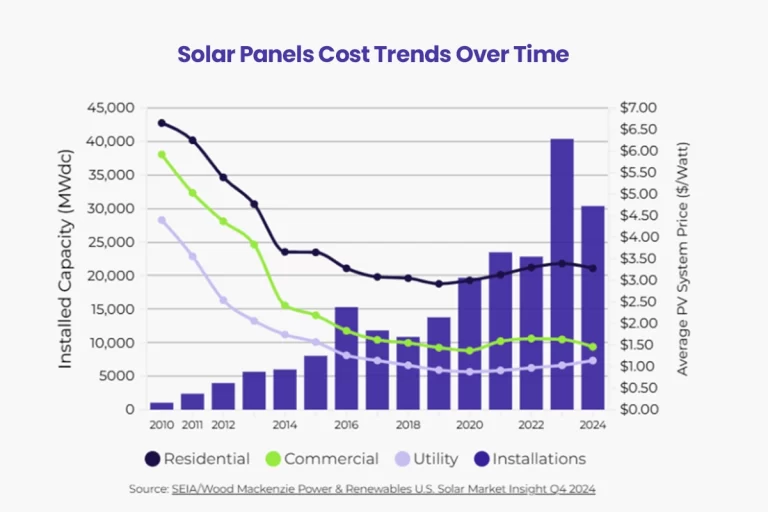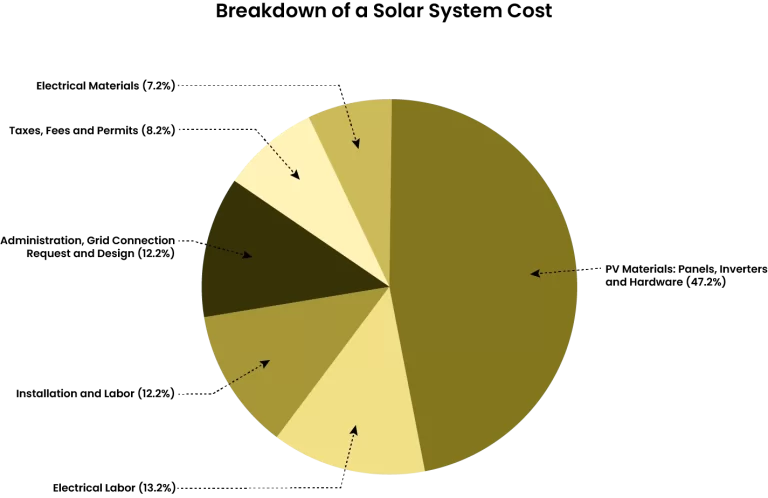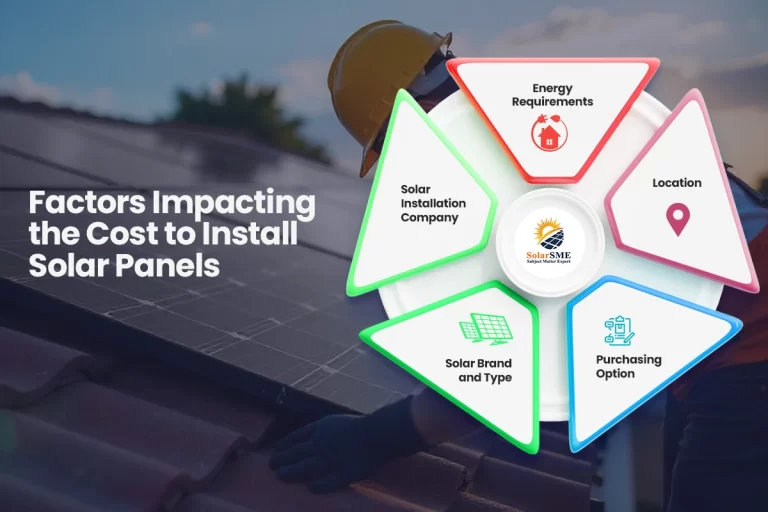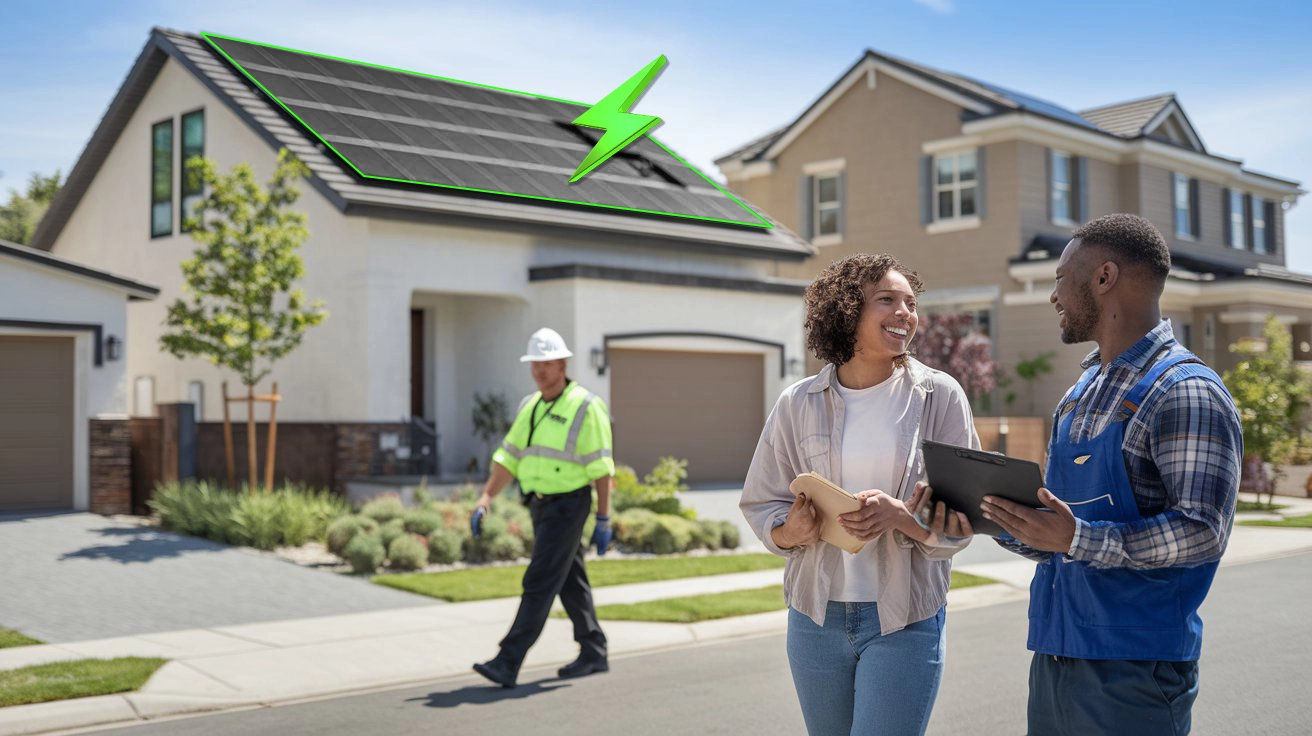- Updated On: February 18, 2025
Solar Panel Cost in 2026: Is it Worth it to Install a Home Solar System?

How much does a solar panel cost?
The average size of a residential solar panel system is 6 kW-10 kW; however, it may vary according to your energy needs and type of solar installation. Also, the cost of a solar panel depends on how you buy it. If you purchase from a full-service installation company like Solar SME, you will likely get a lower price for each panel than buying from a retailer. But if you finance your home solar system through solar loans, the cost may be high due to the increasing interest rate. However, whether you choose to buy or take out a loan, you will be eligible to reduce your solar installation cost with 30% federal tax incentives and your state solar incentives. Although if you go with a solar lease, you can reduce your electric bills too, you will not be able to take advantage of solar programs and tax credits.
Solar Panel Cost Trends Over Time
With the industry development, the price of solar panels has decreased over the last ten years. The graph depicts a sharp decline of around 50% in the cost of installing residential solar panels. Although due to new solar tariffs by Trump, we can expect higher costs, there are still incentives like the solar investment tax credit, local solar programs, and low-interest loan programs to help you go solar with ease.

Solar Panel Installation Cost Breakdown

It is very important for a solar buyer to understand the solar panel cost breakdown for making a wise decision. For example, you can see that solar panels only contribute 20% of the total system’s cost, and if you choose cheap solar panels to reduce your upfront cost, it will impact the overall expense of your solar project. In most cases, this may lead to a low ROI if your home solar panels do not perform efficiently. So, it is always recommended to opt for a top-tier solar system and a trusted solar installer like Solar SME to take out most of your solar investment. Also, you can lower your solar installation costs with state solar rebate programs.
How do I calculate the cost of solar installation?
There are two main methods you can use to analyze the cost of your solar panel system:
- Price Per Watt ($/W): For comparing multiple solar quotes.
- Cost Per Kilowatt-Hour (cents/kWh): For comparing the cost of solar vs. grid energy.
Solar Price Per Watt Calculation
Price per watt = Gross System Cost/System Size (in DC Watts)
While
Gross System Cost = Includes all expenses related to material, taxes, permits, warranties, and solar service cost
System Size (in DC Watts) = Panel DC Watts x Number of Solar Panels
Cost Per Kilowatt-Hour (kWh) Calculation
A kilowatt-hour is an energy unit, and it is equal to consuming 1,000 watts of power over one hour. While price per watt is useful for comparing quotes, kilowatt-hour cost reflects the value of a solar energy system as compared to the grid. The formula is
What factors impact the cost to install solar panels?

Location:
Two location factors, the energy costs in your state and the sun hours, will impact how much solar panels cost and potential savings. If you live in a state with much higher electric prices, going solar may help you save more. Also, the number of solar panels is also a key factor for the system’s cost, and you will require fewer solar panels comparatively if you reside in a sunny state like Texas, Arizona, or New Mexico. Furthermore, if your state offers solar incentives and rebates, you can further lower your installation expenses and enjoy long-term savings.
Energy Requirements:
Purchasing Option
The way you choose to use solar energy impacts the overall cost. If you buy a home solar system with cash, you may need to pay a higher upfront, but you can reduce your expenses with tax credits and incentives. Also, you will be eligible for solar programs like net metering and SRECs that further help you to maximize future savings. However, if you lease a solar system, you need to pay monthly to the leasing company for using solar energy. It’s the same as paying the electric bill to your utility. With this, you may lower your energy bills, but you cannot avail of additional solar benefits like solar owners. So, between solar buy vs lease, experts always prefer to buy a solar energy system either with cash or a solar loan instead of leasing. Learn more about when solar leasing is a good option for you!
Solar Brand and Type
The panels are the core of a PV system’s performance and efficiency. Investing in cheap brands or low-quality solar panels may feel cost-effective initially, but it will not last longer and may become an additional expense for you if you require maintenance and repairs over months. On the other hand, if you invest in the best solar brands and efficient panels like monocrystalline solar modules, your system will cover its cost in a short timeline, and you can enjoy savings for over 25-30 years. Explore the top solar panels!
Solar Installation Company
Your solar installer plays a vital role in making your solar investment worth it. They may charge you a bit more, but they assure you of an efficient solar system, premium warranties, the system’s safety, and above all, peace of mind. So, it is advisable to choose a local solar installer near you for quality installation and peace of mind. Solar SME is a Tesla-certified solar panel installation company offering affordable solar and backup solutions with flexible financing options and leading warranties.
Is solar worth the price tag?
The straightforward answer is YES. If you do a cost-benefit analysis, the average solar payback period is 7 years, and after that, you will enjoy free electricity for the future. If increasing solar panel cost is a consideration, local rebates, and performance-based incentives (PBIs) are still available to offset it. Moreover, there are no hidden solar panel costs, and they require very little maintenance. Overall, a typical homeowner may expect to save $31,000 to $120,000 over 25 years with solar.
Solar SME, a certified solar installer, can assist you with tailored solar and backup solutions and flexible financing options. Get an instant quote of your solar savings with our smart solar calculator.
Related Articles:
With the rise in inflation and frequent power outages, solar with battery backup are popular for reducing energy costs by up to 95%. But, for many people, it is still challenging to manage the significant initial expenses. Learn how solar programs help!
Many solar brands in the market, making it a daunting task to choose the top-rated solar panels for home.
In the United States, rising inflation, high energy costs, extreme weather, frequent power outages, and less grid reliance are the major reasons for switching to solar.



